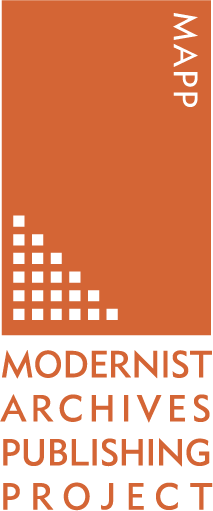Tyler Johansson
Writing biographies for MAPP this summer has been an incredible experience, but it was not without its challenges and its triumphs. I experienced both most whilst writing my biography on C.J.M. Hubback.
I was given a name—not even a name. I was given three initials and a last name of an obscure translator for Dr. Sigmund Freud that no one in the room had heard of: C.J.M. Hubback. My first step as a novice researcher was to take this name to Google. I hoped to gain some insight from a Wikipedia page as to who this man was, and what he might have done in his life other than translating Beyond the Principle Pleasure. There was nothing.
The first bit of information I eventually found on Hubback was her correct gender. For about a week I believed her to be a man, until I found an editorial note that made reference to a MISS Hubback. I was the most excited person in the library that day there might have been dancing because I had finally found something. From there I looked at the publishing of Freud’s books to see if I could glean anything about a Miss Hubback there, like perhaps a first name. I had no such luck. I brought my research to Dr. Willson Gordon and told her I was at a loss: I couldn’t even find this woman’s name. She said that if we have to have a shorter biography that is what we would do. I wasn’t going to give up though; I didn’t want to write a biography that was 10 words long – this person lived a life and I was determined to find out something about it and I wasn’t going to be afraid to ask for help if I needed it.
I took to ancestory.ca and other census websites to look at all the Hubbacks that were born from 1850 to 1920; I wanted to be as broad as possible. It took me over an hour, but I found Caroline Jane Mary Hubback born August 17, 1881. I had the name and date of birth. I emailed Dr. Willson Gordon immediately and asked if there was any way to verify this information. From there, Dr. Willson Gordon sent all I had found on Caroline Jane Mary Hubback to Dr. Battershill of the University of Reading. She then uncovered the birth announcement for Hubback and why she would be on ancesotry.ca. Hubback was the great great niece of Jane Austen. Yes, that Jane Austen.
This was a massive find; it changed the biography because it meant I had a new area to find information on Hubback. I began to look into this Austen connection and uncovered an unpublished manuscript that tracked Jane Austen’s genealogy and actually had interviews with Hubback. This book has the only photo of Hubback with her sisters and father when they were girls. It also mentions Jane Austen's Sailor Brothers: Being the Adventures of Sir Francis Austen and Charles Austen, the book Hubback’s father had written with her sister, a book that is still in print today.
Our next step was to contact the Institute of Psychoanalysis at Dr. Battershill’s suggestion to see if they have any archival materials for Hubback; it turns out they do. The letters we received from the Institute of Psychoanalysis were invaluable because they led to the knowledge that Hubback wanted to do more than translate for Ernest Jones. She wanted to edit and write for him as well. After some digital digging I came across original writings of Hubback’s on pep-web.org done under the name C.J. Hubback. The archivist Joanne Halford also directed us to a book that contained correspondence between Freud and Ernest Jones where Hubback was mentioned.
Since she was such an obscure figure to research, every piece of information that was found felt as if I was stumbling across a gold mine. Every time I added to the biography it was like adding another piece to the puzzle, I had no information to go off of other than what I could find. There are no books or articles written dedicated to Hubback that I could have used as a reference while writing this. To have found a picture or to have figured out that she was an eldest child or that she wrote her own pieces felt important. This piece could have been a paragraph stating that she was an obscure translator for Freud and that that was all we could find as opposed to the nearly 1000 words we now have on her.
Through writing about Hubback for MAPP this summer, I learned not to give up on research even when it seems utterly hopeless. There was always more information to find and there were always people willing to help me when I thought I was irrevocably stuck. While I wrote the actual piece, it was still a collaboration of researching with fellow research assistants and working with professors in hopes of making this biography do justice to someone who has been obscured for many decades, and even in her own time.



